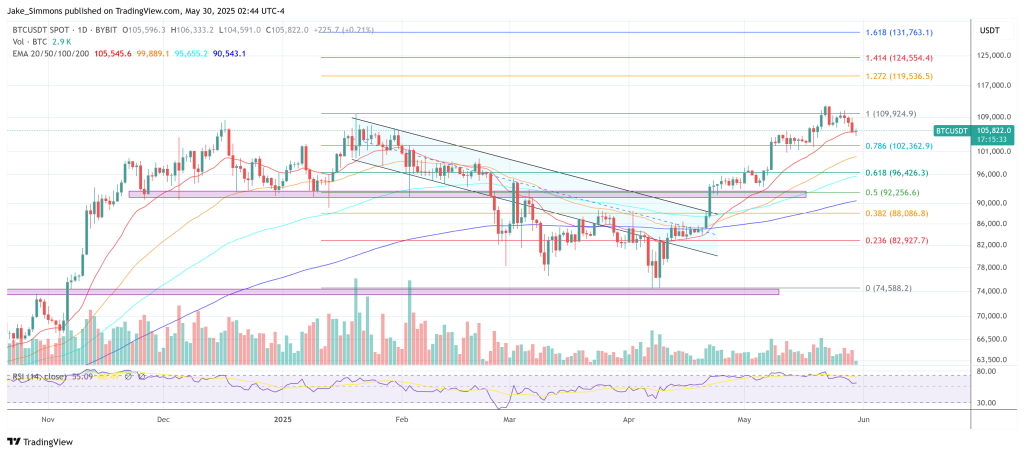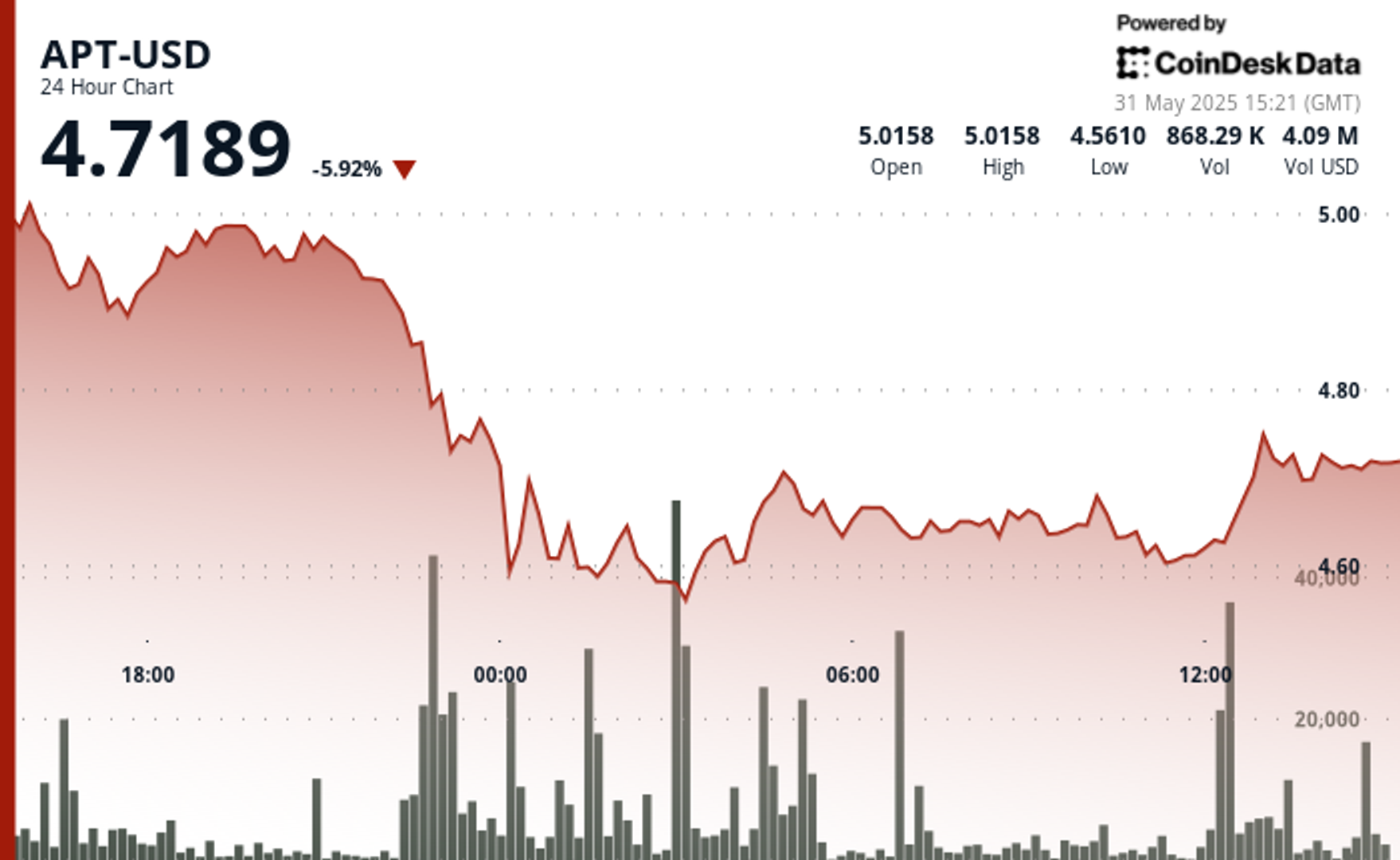Lyn Alden, a leading macroeconomic strategist and financial analyst, took the stage at the Bitcoin 2025 conference with a stark warning: the US fiscal deficit is no longer a problem that can be addressed; it is an unstoppable force. Alden’s address centered around the growing structural issues within the US economy, particularly the government’s runaway spending, and the inevitable impact it will have on asset prices, especially scarce assets like Bitcoin.
Bitcoin Vs. Unstoppable US Debt
“Nothing stops this train,” Alden said, underscoring the severity of the situation. She went on to explain how US fiscal deficits and unemployment rates, which once moved in tandem, have begun to decouple in recent years. “Over the past several years, ever since 2017, we’ve seen a decoupling. Unemployment rates have dropped, yet the federal deficit has ballooned to 6-7% of GDP.” This shift, Alden argues, signals a new fiscal reality that is now irreversible.
Alden’s analysis highlighted that this trend has been exacerbated by the pandemic, but it was already in motion long before. She pointed to historical data, emphasizing that during most periods in the past, when unemployment went up, so did federal deficits, but this pattern has now changed. “This is a new era,” Alden stated. “The decoupling of the deficit from unemployment is something that hasn’t been seen for decades.”
The implications of this fiscal decoupling are significant for investors, particularly those seeking to protect their portfolios from the erosion of purchasing power caused by inflation. Alden turned her attention to the broader asset landscape, showing how gold and Bitcoin have responded to the shifting economic climate. She displayed a chart comparing gold prices to real interest rates, illustrating a strong historical correlation between the two.
Gold and Bitcoin are the two primary reserve assets that compete with each other at that scale,” Alden explained. “When real interest rates are high, investors are enticed to return to the dollar and treasury system. But when those rates are not high enough to keep pace with inflation, gold and Bitcoin shine.”
Alden noted that since 2022, the correlation between gold prices and real rates has broken down, a development that further complicates the economic landscape. “We’ve entered a new environment where both gold and Bitcoin have continued to rise despite rising interest rates,” she pointed out, highlighting the growing divergence between traditional financial assets and alternative assets like Bitcoin. “If you’d asked anyone five years ago whether Bitcoin could hold its ground with interest rates at 4-5%, most would have said no. Yet, here we are, with Bitcoin worth over $100,000 per coin.”
Why Bitcoin Wins
For Alden, this shift is not merely theoretical; it is evidence of a deeper, more entrenched fiscal dynamic. She argued that as US government debt reaches unsustainable levels, traditional methods of controlling inflation, such as raising interest rates, have become ineffective. “When they raise interest rates, they ironically increase the federal deficit at a faster pace than they slow down private sector credit growth,” she explained. “The problem is that we no longer have the brakes attached to the system. The fiscal train is moving full speed ahead, and there’s nothing in place to slow it down.”
Alden also explored how the Fed’s interest rate policies are increasingly unable to control credit growth in the face of rising government debt. “In the past, when federal debt was low, raising interest rates could slow down credit growth effectively. But now, with federal debt surpassing 100% of GDP, every rate hike just accelerates the deficit.” This, she argued, illustrates the structural weakness of the current system—one where the government is forced to keep increasing its debt, as there is no viable way to unwind the fiscal burden.
In stark contrast to the US fiscal system, Alden presented Bitcoin as the ultimate hedge against these inflationary pressures. “Bitcoin is the opposite of this system,” she noted. “Unlike the US dollar, which is constantly being debased by inflationary policies, Bitcoin is an asset defined by absolute scarcity. You can’t create more of it. And that scarcity is what makes Bitcoin an attractive store of value in an era of fiat instability.”
Alden also made the case for Bitcoin’s growing relevance in a world where traditional financial mechanisms are faltering. “The rules that governed the economy for the past century no longer work,” she said. “We’ve gone through the looking glass. We are in a new era where nothing can stop the fiscal train. But Bitcoin, with its transparent ledger and fixed supply, stands apart as an asset that can’t be manipulated or inflated away.”
In conclusion, Alden warned that the fiscal trajectory of the US is set for the long haul. “For the next decade, we will be running very large fiscal deficits in the US, almost regardless of what else happens,” she said. “Nothing can meaningfully decelerate this trend. The only way to protect yourself is to own the highest quality scarce assets. And Bitcoin is at the top of that list.”
At press time, BTC traded at $105,822.

Lyn Alden, a leading macroeconomic strategist and financial analyst, took the stage at the Bitcoin 2025 conference with a stark warning: the US fiscal deficit is no longer a problem that can be addressed; it is an unstoppable force. Alden’s address centered around the growing structural issues within the US economy, particularly the government’s runaway spending, and the inevitable impact it will have on asset prices, especially scarce assets like Bitcoin. Bitcoin Vs. Unstoppable US Debt “Nothing stops this train,” Alden said, underscoring the severity of the situation. She went on to explain how US fiscal deficits and unemployment rates, which once moved in tandem, have begun to decouple in recent years. “Over the past several years, ever since 2017, we’ve seen a decoupling. Unemployment rates have dropped, yet the federal deficit has ballooned to 6-7% of GDP.” This shift, Alden argues, signals a new fiscal reality that is now irreversible. Alden’s analysis highlighted that this trend has been exacerbated by the pandemic, but it was already in motion long before. She pointed to historical data, emphasizing that during most periods in the past, when unemployment went up, so did federal deficits, but this pattern has now changed. “This is a new era,” Alden stated. “The decoupling of the deficit from unemployment is something that hasn’t been seen for decades.” The implications of this fiscal decoupling are significant for investors, particularly those seeking to protect their portfolios from the erosion of purchasing power caused by inflation. Alden turned her attention to the broader asset landscape, showing how gold and Bitcoin have responded to the shifting economic climate. She displayed a chart comparing gold prices to real interest rates, illustrating a strong historical correlation between the two. Related Reading: Bitcoin Warning: Bull Trap Or $270,000 Rocket? Analyst Exposes What’s Coming Gold and Bitcoin are the two primary reserve assets that compete with each other at that scale,” Alden explained. “When real interest rates are high, investors are enticed to return to the dollar and treasury system. But when those rates are not high enough to keep pace with inflation, gold and Bitcoin shine.” Alden noted that since 2022, the correlation between gold prices and real rates has broken down, a development that further complicates the economic landscape. “We’ve entered a new environment where both gold and Bitcoin have continued to rise despite rising interest rates,” she pointed out, highlighting the growing divergence between traditional financial assets and alternative assets like Bitcoin. “If you’d asked anyone five years ago whether Bitcoin could hold its ground with interest rates at 4-5%, most would have said no. Yet, here we are, with Bitcoin worth over $100,000 per coin.” Why Bitcoin Wins For Alden, this shift is not merely theoretical; it is evidence of a deeper, more entrenched fiscal dynamic. She argued that as US government debt reaches unsustainable levels, traditional methods of controlling inflation, such as raising interest rates, have become ineffective. “When they raise interest rates, they ironically increase the federal deficit at a faster pace than they slow down private sector credit growth,” she explained. “The problem is that we no longer have the brakes attached to the system. The fiscal train is moving full speed ahead, and there’s nothing in place to slow it down.” Alden also explored how the Fed’s interest rate policies are increasingly unable to control credit growth in the face of rising government debt. “In the past, when federal debt was low, raising interest rates could slow down credit growth effectively. But now, with federal debt surpassing 100% of GDP, every rate hike just accelerates the deficit.” This, she argued, illustrates the structural weakness of the current system—one where the government is forced to keep increasing its debt, as there is no viable way to unwind the fiscal burden. Related Reading: Bitcoin Up 15% in a Month, Analyst Cautions on MVRV Resistance Level In stark contrast to the US fiscal system, Alden presented Bitcoin as the ultimate hedge against these inflationary pressures. “Bitcoin is the opposite of this system,” she noted. “Unlike the US dollar, which is constantly being debased by inflationary policies, Bitcoin is an asset defined by absolute scarcity. You can’t create more of it. And that scarcity is what makes Bitcoin an attractive store of value in an era of fiat instability.” Alden also made the case for Bitcoin’s growing relevance in a world where traditional financial mechanisms are faltering. “The rules that governed the economy for the past century no longer work,” she said. “We’ve gone through the looking glass. We are in a new era where nothing can stop the fiscal train. But Bitcoin, with its transparent ledger and fixed supply, stands apart as an asset that can’t be manipulated or inflated away.” In conclusion, Alden warned that the fiscal trajectory of the US is set for the long haul. “For the next decade, we will be running very large fiscal deficits in the US, almost regardless of what else happens,” she said. “Nothing can meaningfully decelerate this trend. The only way to protect yourself is to own the highest quality scarce assets. And Bitcoin is at the top of that list.” At press time, BTC traded at $105,822. Featured image created with DALL.E, chart from TradingView.com Bitcoin News, bitcoin, Bitcoin news, bitcoin price, btc, BTC news, btc price NewsBTC


























































































































